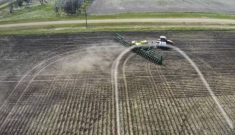A few years ago, I made a simple decision that would end up changing the way I see leadership.
I signed up to get involved in my son’s rec hockey organization. At the time, I was excited. I wanted to be part of something meaningful, to give back, to support him and the other kids.
Read Also

How scientists are using DNA and climate data to breed crops of the future
A method for forecasting how crops will perform in different environments so that plant breeders can quickly select the best parents for new, climate-resilient varieties.
But somewhere along the way, that spark began to fade.
The enthusiasm I once felt was slowly replaced with frustration, exhaustion and — if I’m being honest — a quiet sense of resentment. The energy I brought to the team felt like it was being drained, not renewed. I started showing up out of duty, not desire.
I wondered what had shifted.
And then something unexpected happened. Around that same time, I began exploring a growth mindset for myself. I was learning to become curious about my thoughts, instead of being ruled by them. I began asking different questions. Instead of asking “What’s wrong with this situation?” I asked instead “What’s going on inside of me?”
I started noticing all the things that were working instead of everything that felt hard. I leaned into the small wins, the moments of connection, the kids’ joy on the ice. Slowly, my perspective began to change.
That change wasn’t just mental, it was emotional — even spiritual. I began to feel something again. I felt creative. I felt empowered.
I remembered why I wanted to lead in the first place.
What I’ve learned is this: when we lead from burnout, everything feels heavy. But when we lead from intention — from a grounded sense of self — we create space for possibility. Not just for ourselves, but for our communities.
Community leadership is never just about organizing events or managing tasks. It’s about how we show up. It’s about whether we’re leading ourselves with clarity and compassion or reacting from depletion and doubt.
The more intentional I became with my own thoughts and actions, the more empowered I felt to serve the people around me. And that’s when everything began to shift.
So, if you’re in a season where leadership feels like a burden, I want to offer this advice: you don’t have to change your environment to lead differently. You just have to begin with you.
And from there, everything else starts to change.
Owning your influence: Leadership in the everyday
When I think about intentional leadership, I think about that one person, that individual who is respected, steady. They don’t chase attention, but they have it anyway. They show up with purpose. They speak when it matters — and when they do, people listen.
That’s influence.
In agriculture, it often lives quietly in the background — until someone realizes they’ve been leading all along.
Farmers are leaders, whether they know it or not. If you’re a farmer, you already hold influence in your community. Maybe you host school tours, mentor the next generation, or sit on an ag board. Maybe you’re the one people call when they need a hand or a level head.
Leadership in rural communities doesn’t always come with a title. Often, it looks like consistency, integrity and showing up when it counts.
John Wooden, American basketball coach, said, “The most powerful leadership tool you have is your own personal example.”
When others watch how you lead yourself — through a drought, through a harvest, through a hard season — they’re learning. They’re listening. They’re being shaped by your example.
Intentional influence starts with awareness
The first step to owning your influence is recognizing that you have it.
You don’t have to do more, be louder or take on every role. You simply have to ask: “How am I already leading?” And then, “How can I take that one step further?”
Intentional influence isn’t about being in charge. It’s about being present. It’s about realizing your actions speak louder than your words but still choosing your words with care.
Intentional leaders in agriculture show up with purpose. They ask questions. They make space for others. They know that their influence doesn’t end at the fenceline.
That influence expands into the school board meeting, the grain elevator coffee chat, the 4-H group needing support, or the young neighbour who’s watching and learning, whether you know it or not.
You don’t need to be perfect. You just need to be aware.
Because when you own your influence, you stop leading by accident.
You start leading with impact.














